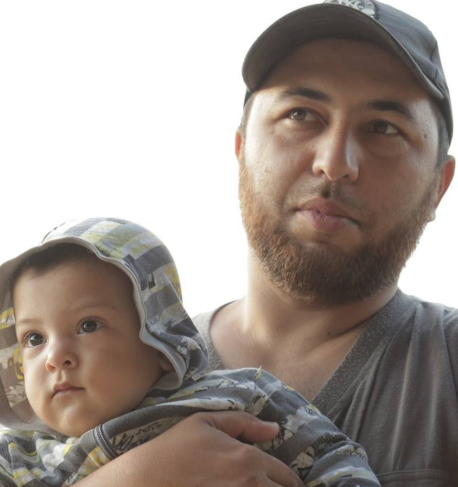• Topics / Freedom of expression
• Topics / Human Rights Abuses in Russian-occupied Crimea
Osman Arifmemetov, Crimean Solidarity journalist imprisoned for his words in Russian-occupied Crimea

Osman Arifmemetov is a maths and information science teacher and programmer by profession, who reacted to the mounting number of political prisoners after Russia’s annexation in 2014 by becoming one of the main civic journalists reporting for the Crimean Solidarity civic initiative on searches, arrests and court hearings.
Then on 27 March 2019, Russia’s FSB came for him and 23 other Crimean Tatar civic activists and journalists, most of them from the Crimean Solidarity civic initiative. It was the most brazen attack to date and was internationally recognized as aimed at crushing the Crimean Tatar human rights movement and forcing activists into silence or exile. As of March 2020, 25 men are imprisoned on the same fabricated ‘terrorism’ charges, and held in appalling conditions in occupied Crimea or Russia.
Born on 28 August 1985, Arifmemetov had only known of the suffering the Crimean Tatar people endured during Stalin’s 1944 Deportation from the stories of his grandparents. The first months of his imprisonment brought many bitter echoes of those accounts which he has described in a poignant and award-winning text from prison entitled ‘My Deportation’.
Persecution
As with most Crimean Solidarity civic journalists and activists, Arifmemetov had earlier suffered less serious repressive measures for his activism. On 21 February 2017, he was one of 10 activists jailed for five days merely for standing and streaming information onto the Internet about the armed search of the home of Marlen Mustafaev.
On 29 March 2017, a Crimean Tatar activist Bilyal Adilov was seized by masked men in camouflage gear from outside the Russian-controlled High Court in Simferopol, while reading a prayer for the release of political prisoners. It was Arifmemetov, who immediately went live on Facebook, showing a video of the men abducting Adilov. According to Arifmemetov’s Crimean Solidarity colleague Lutfiye Zudiyeva, it was the wide coverage that the videoed abduction received in the Ukrainian media that helped them to understand that they could use direct broadcasts on Facebook to inform people about what was happening in Crimea. This was clearly not to Russia’s liking.
Arifmemetov continued to show support for and write about victims of persecution and their families, until 27 March 2019, when he became one of Russia’s victims himself.
Torture
Arifmemetov was not at home early on 27 March 2019, and was seized very brutally by officers late that evening, together with civic journalist Remzi Bekirov and activist Vladlen Abdulkadyrov. All were beaten, before being taken, handcuffed behind their backs, to Simferopol.
The arrests that day so obviously targeted men for their civic activism that Russia hurried to remove them from Crimea. Over the last year, they have been moved several times, and are being held in conditions that are equivalent to torture.
Unconcealed attack on civic activists
Although the armed searches and arrests on 27 March 2019 were used for propaganda purposes in the Russian and Russian-controlled media, the obvious targeting of civic activists and journalists was widely condemned by the international community, with Human Rights Watch stating that attempts to portray politically active Crimean Tatars as terrorists are aimed at silencing them, and Freedom House and Civil Rights Defenders equally clear that the arrests were to terrorize Crimean Tatars, not about fighting ‘terrorism’.
On 21 May 2019, the renowned Memorial Human Rights Centre declared the first 24 men arrested political prisoners and accused Russia of using fabricated charges carrying huge sentences to try to crush the Crimean Solidarity movement in occupied Crimea and all Crimean Tatar human rights activists.
On 18 July 2019, the European Parliament adopted a resolution in which it named all of the 25 Crimean Tatar activists among political prisoners whom it called upon Russia to release.
Absurd charges
Not one of the men is charged with a recognizable crime or even a plan to commit a crime. Instead they are accused of ‘involvement’ in the peaceful Hizb ut-Tahrir party which is legal in Ukraine and which only one country in the world - Russia - has labelled ‘terrorist’, and without providing any real explanation. Civic journalists Remzi Bekirov and Ruslan Suleymanov, as well as three civic activists Farkhod Bakharov; Riza Izetov and Shaban Umerov are charged with ‘organizing a Hizb ut-Tahrir cell’ [Article 205.5 § 1 of Russia’s criminal code], carrying a sentence of up to life imprisonment. Arifmemetov and the other men are accused of ‘involvement’ in such a group [ Article 205.5 § 2]. They face a sentence of between 10 and 20 years despite the lack of any ‘terrorism’, or internationally recognizably crime.
In March 2020, all 25 men were also charged, under Article 278, with “planning a violent seizure of power and change in Russia’s constitutional order”. It is extraordinary that a country which sent in armed soldiers without insignia and paramilitaries to seize another country’s territory should now be charging Ukrainians with plans for just such a seizure. Especially given that not one of the searches uncovered any weapons or ammunition.
It is not only the lack of any evidence of criminal behaviour in these prosecutions that is so disturbing. These ‘trials’ do not even require evidence of involvement in Hizb ut-Tahrir, since Russia uses ‘experts’ who will always be prepared to provide the ‘assessment’ required, and ‘secret witnesses’ who can have been tortured or paid into testifying to having heard the men talk about Hizb ut-Tahrir.
Osman and his wife have two small children, Fatima, who was born in 2015, and Mustafa (2017).





